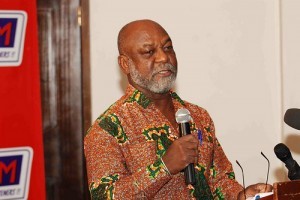Former Executive Director of the Media Foundation for West Africa (MFWA), Prof Kwame Karikari, has said Northerners in the Mahama administration appears to be failing the North.
According to him, the current crop of Northerners in government needs to show more commitment to ensure that the Savannah Accelerated Development Authority (SADA) programme designed to bridge the gap between the impoverished north and the rich south works. The Authority is an independent state agency responsible for coordinating a comprehensive development agenda for the northern savannah ecological zone in Ghana.
Its poverty-alleviation programmes have been fraught with allegations of corruption and financial malfeasance.
Critics, including Civil society groups and the Minority in Parliament, say virtually nothing has been achieved by the programme’s Ghc32.4 million afforestation project undertaken by ACI Construction Limited, a subsidiary of the AGAMS group of companies. Critics claim virtually all the trees planted in the Northern Savannah Zone perished because they were nursed in the dry season.
The afforestation plantations started in June 2012 after SADA entered into a contract with ACI Construction Limited.
Contrary to criticisms, however, a recent draft final report released by the University of Development Studies (UDS) said: “The average percentage survival of all the planted species in the SADA plantations were very high (85%) with the highest (88%) recorded in the Eastern Zone and the least (76%) in the Southern Zone.”
The UDS report titled, “Evaluation of SADA-ACILCL Afforestation Project” said: “A total of 145 plantations were surveyed in all the four afforestation zones encompassing 45 political districts in 5 regions. Eight tree species were planted in the various operational zones namely; Tectona grandis, Senna siamea, Albizia lebbeck, Khaya senegalensis, Mangifera indica, Anacardium occidentale, Eucalyptus spp. and Moringa oleifera.”
A team of experts led by Prof. S.K.Oppong inspected the plantations. His team included W.J. Asante, Mr. D.Tom-Dery, and Mr. B.N. Baatuuwie.
Apart from the alleged tree-planting fiasco, SADA is also accused of wasting Ghc15 million on a Guinea fowl project. Again critics say there is no value for money in that project.
Speaking at the Centre of Democratic Development’s 10th Kronti ne Akwamu Lecture on the topic: “The paradox of voice without accountability in Ghana," Prof Karikari bemoaned that: “One would have thought that leaders from the north in this particular NDC administration would take advantage of the national consensus to promote more than anyone else, the development of the North as envisaged in the establishment of SADA.”
He said: “For political leaders, chiefs and other members of the middle class from the north, it is a test of their patriotism to ensure that the dream of the patriots from the region who pioneered the idea is achieved.”
“Will today’s generation of Northern leaders…betray the trust bequeathed them by these patriots?
“President John Mahama who certainly must consider himself a proud son of the north has a single patriotic and historic responsibility to make SADA work,” Prof. Karikari said, adding that: “The NDC which claims to be the party of the masses…will its government deliver on SADA or will it turn out to be another humiliating saga of ‘edey biii k3k3’?”
Prof Karikari also observed that: “SADA is a national programme for all of Ghana [and] its conception and structures for its actualisation must be seen as that. Therefore it is not in the interest of either the immediate beneficiaries – that is the Northerners – or the country as a whole, to design its governing structures to give the impression that only Northerners can develop the north. The development of the north is a patriotic task. It is should be every Ghanaians concern to rescue SADA from failing it is as it is going off the rails.”
In his view, SADA “has become, as a matter of longstanding national political consensus, the most enduring popular voice for the right to develop.”
According to him, the success of the programme could help reduce perennial ethnic conflicts in the northern part of the country since the root cause of the conflicts – poverty – would be tackled.
“Today serious discrepancies still remain between the North and the rest of the country in terms of levels of economic development. And at the risk of sounding simplistic, Mr. Chairman, I want to suggest that the incessant of flare ups of communal violence between or among contending ethnic groups in the North could be explained also by the generalised and deepening culture of poverty of the region.”
General News of Wednesday, 30 April 2014
Source: radioxyzonline

















